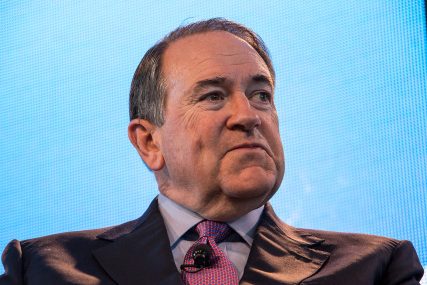As we head into the presidential race, there’s a myth I need to bust.
There is no evangelical movement within the GOP.
Yes, there are evangelical voters. Yes, there are voters for whom social issues are a top priority. But this doesn’t mean that they’re a movement.
A political movement is more than a bunch of people who happen to believe the same thing. It is an organized effort to change politics. Individuals need to show that they’re willing to invest their time and treasure into an organization that will accomplish more than the individuals can do on their own.
No organization? No movement. Period.
Successful political movements are defined by organizations with actual members who work together to achieve a political goal. The National Rifle Association, League of Conservation Voters, Sierra Club, the NAACP, and many other groups pool their time and resources, members of these groups achieve something more than they could ever do as individual voters.
Evangelicals in the GOP isn’t like this. At best it’s a bunch of would-be kingmakers unable to put aside their egos and petty differences to form a national movement capable of making a difference in the election.
Evangelicals, as voters, are at best unorganized and at worst disorganized. They may hold to some strong beliefs, but they have organized themselves into thousands of denominations and associations. Indeed, the term “evangelical” is an umbrella term that is useful but masks differences that make political organization difficult, if not impossible.
Take this headline from the New York Times:
Evangelicals Aim to Mobilize an Army for Republicans in 2016
The article is a fantastic look at David Lane, who is a one-man operation trying to organize pastors. Despite the otherwise fine journalism, the article propagates myths and stereotypes about evangelicals.
The “evangelicals” of the article are activists from fundamentalist and Baptist backgrounds, with ties to the American Family Association and the Moral Majority. The denominations of the pastors are never identified, nor is there information on the size of their congregations. This information matters because would tell us if they’re all from the same camp within evangelicalism or a broad coalition of evangelicals. My hunch is that it’s a bunch of pastors from similar churches who think being ecumenical means joining a church softball league that includes more than two kinds of Baptists.
The Times article sees this disorganization but doesn’t recognize it as something that is endemic to evangelical politics. It’s seen as something new, something that evangelicals want to overcome so that they can wield political power as they did in days gone by.
Take this comparison of today’s approach to yesteryear:
It is an organizing approach far different from those in the days when larger-than-life leaders like the Moral Majority founder, Jerry Falwell, who died in 2007, or Pat Robertson, now 84, could activate evangelical voters simply by anointing a candidate.
This is total myth. These leaders never, ever “anointed” a candidate behind which all or even most “evangelical voters” backed. At best, Falwell’s Moral Majority mobilized fundamentalist Baptists. A decade later, Robertson’s Christian Coalition attracted Pentecostals. But both the Moral Majority and the Christian Coalition failed to attract and keep a coalition that could bring together the religious camps within evangelicalism.
Such a coalition may be impossible. Bringing together fundamentalists and Pentecostals into a single movement has less chance of success than a Hatfield & McCoy Association for Peace in Appalachia.
This idea that evangelicals would somehow back a candidate simply because some religious-turned-political celebrity said so is more than myth. It is an insulting, offensive stereotype of evangelicals as sheep who believe and act in response to what they’re told. They couldn’t be thoughtful voters (or as thoughtful as any other voter) who decide to back candidates without the aid of pastors or pundits. Evangelicals as loyal, dim-witted followers is a stereotype that continues to exist despite clear evidence to the contrary.
Consider the situation of just three years ago. Going into the South Carolina primary, Christian conservatives saw the threat of Mitt Romney winning. They needed to coalesce behind someone–anyone–who could be the viable alternative to Romney. A group of 150 leaders met together (yes, that’s one-five-zero “leaders”). After debating the merits of the candidates, the group picked Rick Santorum. In the South Carolina primary, Santorum not only lost, he finished third. Evangelical voters ignored the supposed “leaders” of the movement and backed Newt Gingrich. In fact, as many evangelicals voted for Romney as voted for the anti-Romney candidate chosen by the religious right confab that claims to represent a movement.
This year is no different. There are hundreds of self-appointed leaders of groups with no members. Each one is willing to tell donors and reporters that he alone controls the deus ex machnia.
This year, David Lane is poised to become the new face of the mythical movement. He leads no one, but somehow he’s convinced people that he’ll raise up an army of activists. But even as he does so, Lane demonstrates the fractures nature of evangelical politics. Lane has his roots in the Moral Majority and other fundamentalist groups. When asked about Jeb Bush, Lane slams Bush’s evangelical liaison, Jordan Sekulow, an operative from the Pat Robertson camp.
In the end, evangelical voters will do what they always do. They will vote for a candidate they find viable to win both the nomination and the election. When many of them vote the same way, it’s because they see the world in the same way. It is not because a self-appointed shepherd managed to corral the sheep.
Don’t miss any more posts from the Corner of Church & State. Click the red subscribe button in the right hand column. Follow @TobinGrant on Twitter and on the Corner of Church & State Facebook page.






